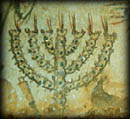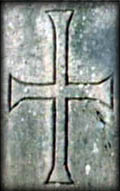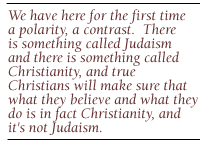Wrestling with Their Jewish Heritage
Professor of Classics and Director of the Religious Studies Program University of Texas at Austin2ND REVOLT PRECIPITATES CHRISTIAN/JEWISH SPLIT
The one thing that does happen in the second revolt... is [that] the self-consciously apocalyptic and messianic identity of Bar Kochba forces the issue for the Christian tradition. It appears that some people in the second revolt tried to press other Jews, including Christians, into the revolt, saying, "Come join us to fight against the Romans. You believe God is going to restore the kingdom to Israel, don't you? Join us." But the Christians by this time are starting to say, "No, he can't be the Messiah -- we already have one." And at that point we really see the full-fledged separation of Jewish tradition and Christian tradition becoming clear.
Woolsey Professor of Biblical Studies Yale UniversitySEPARATION FROM JUDAISM
At what point did Christians start thinking of themselves as separate from Judaism?
 ... Christianity, in its earliest beginnings, is part of Judaism... it is a sect, among a number of varieties of Judaism in the Roman Empire. But it is also clear that at a certain point, they develop a consciousness which takes them outside of the social orb of Judaism. They're no longer part of the local Jewish community, they're a separate community, meeting in little household groups, all over the city. And, it's apparent, at least from the time of the Emperor Nero, that outsiders also view them as distinct. So that when Nero is looking for scapegoats upon whom to put blame for the fire in Rome in 64, he zeroes in on the Christians.
... Christianity, in its earliest beginnings, is part of Judaism... it is a sect, among a number of varieties of Judaism in the Roman Empire. But it is also clear that at a certain point, they develop a consciousness which takes them outside of the social orb of Judaism. They're no longer part of the local Jewish community, they're a separate community, meeting in little household groups, all over the city. And, it's apparent, at least from the time of the Emperor Nero, that outsiders also view them as distinct. So that when Nero is looking for scapegoats upon whom to put blame for the fire in Rome in 64, he zeroes in on the Christians.
So, obviously they are recognized as a distinctive group. How did this happen? What is involved in their separation? The one thing I think we have to recognize is that it doesn't happen all at once. It does not happen in the same way in different places, nor does it happen at the same time. For example, as late as the 4th and 5th century, we have evidence of Christians still existing within Jewish communities, and we have evidence of members of Christian communities participating in Jewish festivals. The preacher of Antioch and later of Constantinople, John Chrysostom, complains in a series of eight sermons to his congregation, that "you must stop going to the Synagogue, you must not think that the Synagogue is a holier place than our churches are." This clearly indicates that the break between Judaism and Christianity, even as late as the 4th century ... still is not absolute, is not permanent. Yet, on the other hand, we can see even in Paul's letters, which are the earliest literature we have from the early Christians, that the social separation in the communities he founded has already taken place. They're not meeting with the Jews. They're meeting in various households. So it's a varied change. It doesn't happen all at once and it doesn't happen in the same way, everywhere.
ATTITUDES TOWARDS JUDAISM IN EARLY CHRISTIAN WRITINGS
 By the same token, you can see different attitudes towards the Jewish community in various writings of the early Christians. So that for example, in the Gospel of John, the Fourth Gospel, you have some of the most vehement statements against the Jews. [This is] very strange because all of the characters in the Fourth Gospel are Jewish. It seems to be an intra-Jewish dialogue going on, but it's obviously a very vehement dialogue, a very polemical dialogue, and clearly represents... [that] somewhere there has been a very painful separation of one group of Jews who followed the Messiah, Jesus, from other Jews, and there is great hostility as a result and tremendous feelings of persecution, which are enshrined in this piece of literature.
By the same token, you can see different attitudes towards the Jewish community in various writings of the early Christians. So that for example, in the Gospel of John, the Fourth Gospel, you have some of the most vehement statements against the Jews. [This is] very strange because all of the characters in the Fourth Gospel are Jewish. It seems to be an intra-Jewish dialogue going on, but it's obviously a very vehement dialogue, a very polemical dialogue, and clearly represents... [that] somewhere there has been a very painful separation of one group of Jews who followed the Messiah, Jesus, from other Jews, and there is great hostility as a result and tremendous feelings of persecution, which are enshrined in this piece of literature.
Paul, on the other hand is firmly convinced that the present separation between Jews and gentiles cannot be permanent in God's plan, that the promises which God has made to ancient Israel will be kept. He cannot have abandoned his people, Israel, even though, for the moment, most Jews have not accepted Paul's message, nor the message of other Christian Apostles. Paul still believes that there will come a time when God will do something else unaccepted and novel -- as novel as the notion of a crucified Messiah -- and thus, he says, all will be saved. So the attitudes within the Christian movement towards their parent religion, as we would call it, Judaism vary across a wide spectrum.
EMERGENCE OF "THE CHURCH"; CHRISTIAN SELF-IDENTITY AS THE PEOPLE OF GOD
When does the church actually kind of begin to emerge as the church? When does this happen? What's the process by which it happened?
The word "church" is a tricky one. There is a Greek word, ecclesia, which we translate in all modern translations as "the church," and this is a total anachronism, because nobody in the Greek world would have had any concept which was remotely similar to what we regard as a church. This is a political term; an ecclesia is just a meeting, and preeminently the meeting of the free citizens of a city which is constitutionally organized, so that its citizens can vote on important things. And so when Paul writes to the meeting, the ecclesia of God, of the Thessalonians, this is a very strange kind of notion because ordinarily the town meeting of the Thessalonians is a political thing which couldn't be more different from a group of a dozen or so people who have converted to this community meeting in somebody's house. How does that get to be a church, in our sense of the word? How do these little household meetings come to be thought of as a universal church or the Catholic Church or the Orthodox Church? This is something which happens over a long period of time and is deeply part of that process by which this new movement works out its relationship to the larger culture, as it institutionalizes itself, to use a modern sociological bit of jargon, as every movement has to if it's going to survive.
But hidden within this development is a piece of self-identity, is a notion of who one is, which comes straight out of the history of Israel. The notion that God has made a treaty, a contract, a covenant, with a group of people, and they will be his people. So this fundamental part of the consciousness of Israel, as being the people of God put among the peoples of the world in order to bring God's intention for humanity to fruition, this is shared by, I think, all of the important groups of early Christianity. Diverse as it was, they all have the sense that, in some way, we have to embody this ancient sense of who Israel was. We either take the place of Israel or we fulfill the notion of Israel or we're a part of the Israel that wants to be a people of God. And, it is this self-concept, I think, which cannot be forgotten, as [part of the process that produces the Church].
Samuel Ungerleider Professor of Judaic Studies and Professor of Religious Studies Brown UniversityTHE EMERGENCE OF CHRISTIAN SELF-IDENTITY
 Tell me about the word "Christianity." Where does it come from? What does it mean?
Tell me about the word "Christianity." Where does it come from? What does it mean?
An important milestone into development of Christian self-consciousness or Christian self-identity will be the emergence of the word "Christianity." This word appears for the first time in the writings of a church thinker of the early 2nd century of our era named Ignatius, who lived in Western Asia Minor, modern day Western Turkey. Ignatius in his letters is warning his flock to stay away from all sorts of theological perils out there, including Judaism and including all sorts of mistaken Christian theologies. And, in his writings, Ignatius uses the word Christianity, and he uses it ... in contrast with the word Judaism. We have here for the first time a polarity, a contrast. There is something called Judaism and there is something called Christianity, and true Christians will make sure that what they believe and what they do, is in fact Christianity and it's not Judaism. That is explicit and unambiguous for the very first time in the writings of Ignatius around the year 110 or 120 B.C....
Professor of Religion and Archaeology Duke UniversityEARLY TENSION BETWEEN CHRISTIANS AND JEWS EXAGGERATED
One of the awful aftermaths of the first war with Rome was that Jews and Christians - or the followers of Jesus or the Jesus movement, as you might call it - took different directions. Not all of them, of course. I believe that many followers of Jesus stayed in the land. Some went to Trans Jordan. Some went off to the Diaspora lands and made their new way, and the gentile church evolved. But for the Jewish followers of Jesus and their Jewish compatriots, many of them reestablished themselves in the Galilee, and other parts of the east. And I believe they lived side by side for several hundred years in that area with one another, and it's a story that can be told only very invisibly through archaeological inferences and through some literary sources....
You have the beginnings of a gentile church outside of Israel. But I'm not sure that the tensions that most people associate between Jews and Christians really occur before the fourth century, when Christianity becomes the official religion of the Roman Empire, under Constantine. I think all of these tensions are exaggerated. This was an internal family war between cousins and brothers and sisters and people like that. But the tensions, I think, have been grossly exaggerated, and you only need to turn to some of the great multi-religious and multi-ethnic cities of the east to see that Jews and Christians managed to get on for longer periods than most people assume....
Most of the gospel and traditions of early Christianity were written down after the first war, and they reflect a period of theological disagreement. And the new narrative history that evolved, in the form of the New Testament, tells a story of a broken relationship, and that's part of the sad story that evolves between Jews and Christians, because it is a story that has such awful repercussions in later times. But it is not necessarily reflective of all of the local situation in the first three centuries.
